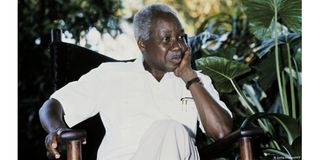Nyerere’s tribute: Stinging speeches with nationalism

Julius Nyerere, The Father of the Nation PHOTO | FILE
What you need to know:
- The father of the nation was known for his firm stance, though, he would as well retract from his hard-line stance to reset implementation strategies of his policies when necessary
Arusha. Although respected and feared in equal measure, Mwalimu Julius Kambarage Nyerere was not excessively temperamental.
He would control his mood even in the most challenging times and avoid “raining down” on leaders or government officials who may have erred.
But not on issues that would compromise his leadership principles and the country’s sovereignty and stature among the community of nations.
If he did not address the nation on radio or at the public rally, he would relay his burning concern through a meeting of elders, mostly in Dar es Salaam.
The Nation Founder was probably in his true element when he made one of his stinging speeches to the nation towards the end of 1966.
That was after he sent home packing students of the University of Dar es Salaam (UDSM) and other higher learning institutions. The students had protested against being conscripted to the National Service, seeing it as something not deserving of the learned lads.
They marched through the streets of Dar es Salaam and some reports had it that they went as far as the State House on the oceanfront.
What annoyed Mwalimu, reports later emerged, was not necessarily their opposition to forced military conscription being the learned guys.
It was a widely circulated protest note in which the protestors told Mwalimu point blank that the colonial administration was better than his!
The protest nearly shook the government to its core as the students rampaged the streets against the National Service.
Mwalimu’s first action was to close the university and send home the young learners while strategising on the next move.
Maybe that was one of his first embarrassing challenges after independence barely five years earlier (1961) and the Union some two years later (1964). Having closed the respected institution of higher learning, Mwalimu addressed the Nation, telling Tanzanians why he had to take action against the protesters.
The speech in Dar es Salaam was either made before a rally or through an elders’ forum and was broadcast live by Radio Tanzania. For those who listened to the live broadcast, it was too obvious Mwalimu was enraged by what he saw as an attempt to downplay his tireless efforts to unite Tanzanians.
He would narrate how he left his well-paying job then (as a secondary school teacher) to fight for the country’s independence.
Added were the benefits of National Service, a programme introduced not necessarily for military skills, but to instill a sense of nationhood.
Mwalimu may have been taken by surprise by the coordinated opposition of his project by the students, later joined by other people. The National Service has been around for a couple of years before although the university students were not among the recruits.
“Mnasema ni afadhali wakati wa Mkoloni?” (Are you seriously saying colonial rule was better than what we have now?” the enraged Head of State asked repeatedly during his long speech.
He was firm that his decision was final. For scores of students sent to their rural homes, it was a blessing to their remote areas; they were hired as teachers. Radio Tanzania anchor, a lady at the studio would confirm later as she signed off that this was among Mwalimu’s longest public speeches since independence!
About a month later (November 1966), Mwalimu was to convene a meeting of elders in Dar es Salaam and to their cheers, he announced that he had pardoned the students and that the academy would reopen. That was Mwalimu who would often retract from his hard-line stance and try to reset implementation strategies of his policies when necessary.
Although records are not there, he would often use the elders as a platform to tell the Nation on the burning issues.
He did so in 1967 when he played down Oscar Kambona who had fled the country that he (Nyerere) was not shaken by the latter’s defection.
He used the same platform to launch stinging attacks against Seif Sharrif Hamad, when he ditched the ruling party on grounds Pemba people were being sidelined.
Mwalimu was vocal in his foreign policy and this was not surprising. Many countries that surrounded Tanzania in the 1960s were still under colonial rule. Although Tanzania offered a logistics base for the Mozambique liberation war, it was the struggle for Zimbabwe (then Rhodesia) that consumed much time. Tanzania under Mwalimu Nyerere was simply in the heart of the process for Zimbabwe’s long fight for Uhuru; both at the negotiating table and in the bush. It began with Tanzania severing ties with Britain over the Unilateral Declaration of Independence (UDI) by Ian Smith in November 1965.
Later on, Mwalimu was to tell off the then Malawian leader Hastings Kamuzu Banda who not only supported the white ruled regimes in southern Africa. Malawi, then enjoying support of apartheid South Africa and Portuguese-ruled Mozambique, also laid claim on some districts bordering Lake Nyasa. But it was Mwalimu’s showdown with Idi Amin Dada, the ruthless dictator in Uganda, which dominated much of the 1970s.
From the day Amin took power in January 1971, Nyerere was categorical that he would not recognise the regime he termed as murderous or sit on the table with Amin.
The Libyan leader Muammar Ghadhafi who tried to defend Amin during the latter’s sunset days against an onslaught by Tanzanian forces, was also told off. In matters of the country’s sovereignty, there should be no compromise or discussions on the table as Tanzania avoided in its war with Uganda.




